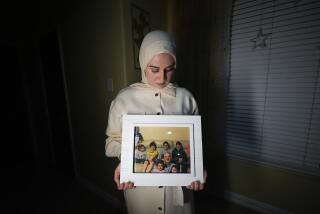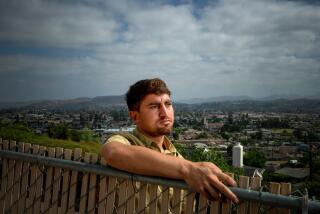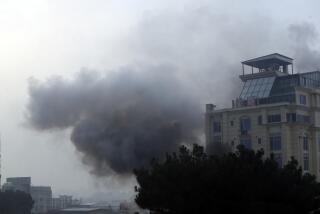Iraqi Facing Deportation Denies Charges of Espionage
- Share via
An Iraqi dissident fighting for political asylum in the United States took the witness stand Wednesday and denied government allegations that he might be an intelligence agent for a foreign power, including the regime of dictator Saddam Hussein.
Attorneys for the U.S. Immigration and Naturalization Service contend that Dr. Ali Yasin Mohammed Karim, whom the U.S. evacuated from Iraq in late 1996, might be a spy for Iran, Iraq or Syria and should be excluded from the United States.
His case, which started last week at U.S. Immigration Court on Terminal Island, has attracted national attention and raised serious questions about the use of secret evidence and uncorroborated information in government efforts to deport people suspected of being national security risks.
Based on formerly secret documents, Karim, 37, and five other dissidents were accused of being spies. But at a previous trial during which former CIA Director R. James Woolsey, now a Washington lawyer, served as part of their defense team, the government was forced to release the documents.
The disclosures prompted the government to offer a deal, and five of the men agreed to eventually be deported to another democratic country. However, Karim, whose wife divorced him during his three years in jail, declined the offer and has gone to court to clear his name. If he prevails, Karim will be granted the right to apply for political asylum.
INS officials assert that Karim’s cousin is a suspected Iranian intelligence agent and that the doctor cast suspicion on himself by traveling to Iran, changing his last name, and misleading FBI agents about how his brother Mohammed made it into the United States.
On the stand Wednesday, Karim, who was a member of the U.S.-backed Iraqi National Congress, spoke through an interpreter and denied any ties to foreign intelligence operations.
When asked by his attorney Niels W. Frenzen whether he ever worked as an Iranian or Iraqi agent, Karim answered, “Never in my life.” When questioned about whether he was ever an operative for Syrian intelligence, he said, “There is no such thing.”
“I am only a doctor who worked for the Iraqi National Congress and the Iraqi Broadcasting Corp.,” Karim told the court. The Iraqi Broadcasting Corp. was the propaganda arm of the national congress, a political organization opposed to Hussein.
Karim, who is a Kurd, said that he made two or three trips to Iran as a child in the mid-1970s and a final trip to the country in 1991 to escape an attack by Hussein’s army on Kurdish areas of northern Iraq.
He testified that he also made two trips to Syria, once as a child in 1974 and once in September 1996 to escape military attacks on opposition groups by Hussein. He said he and his family crossed the Syrian border at a point nearest his home in northern Iraq.
While in Syria, he said, he tried to obtain visas to travel to the United States, but was told by embassy officials to apply through the United Nations. Karim testified, however, that he and his family returned to northern Iraq after his cousin notified him that he was on a list of people to be evacuated to Guam by the U.S. government.
Karim’s brother Mohammed was not among those to be evacuated. The doctor testified that he wanted to take Mohammed with him because he suffers from post-traumatic stress syndrome and schizophrenia.
Mohammed managed to get out of Iraq, Karim said, by assuming the name of another person on the evacuation list who wanted to remain behind. That person’s mother agreed to pretend that Mohammed was her son so he could get on the plane for Guam.
But when Karim and his brother arrived on the island, the ruse was discovered and Karim allegedly lied to FBI agents there about whose idea it was. Karim was caught in the lie, and now INS attorneys say he is untrustworthy.
While the government contends that Karim’s version raises suspicions about him, Frenzen argues that the incident is irrelevant to whether Karim is a national security risk. His only motive, Frenzen said, was to save his brother because he couldn’t care for himself and might have been killed by Iraqi soldiers if left behind.
In other questioning Wednesday, Karim disputed the government’s charge that he might have changed his last name to hide his identity. Information developed by FBI agents on Guam indicated that he and his family might have used the name Falyi, but when he gave them his name he didn’t use Falyi. Government officials argue that this is yet another sign of deception.
On Wednesday, Karim testified that neither he nor members of his family have ever used Falyi in their names.
Karim said the word actually designates a Kurdish dialect or someone’s religion. He noted that during his interviews on Guam, he had to correct FBI agents who kept saying “Ufalyi” instead of “Falyi.”
More to Read
Sign up for Essential California
The most important California stories and recommendations in your inbox every morning.
You may occasionally receive promotional content from the Los Angeles Times.














